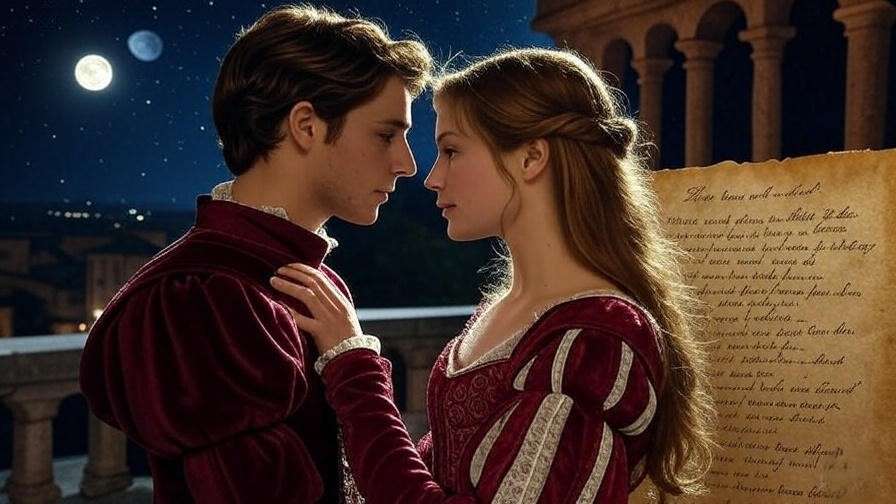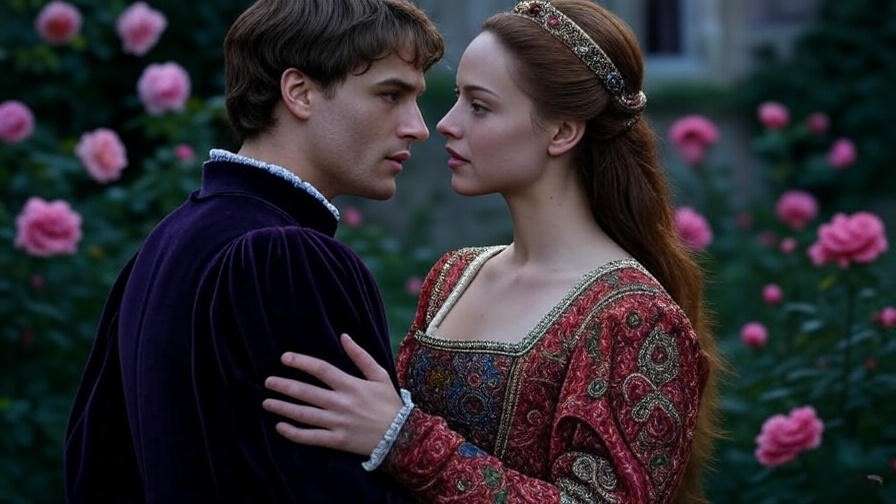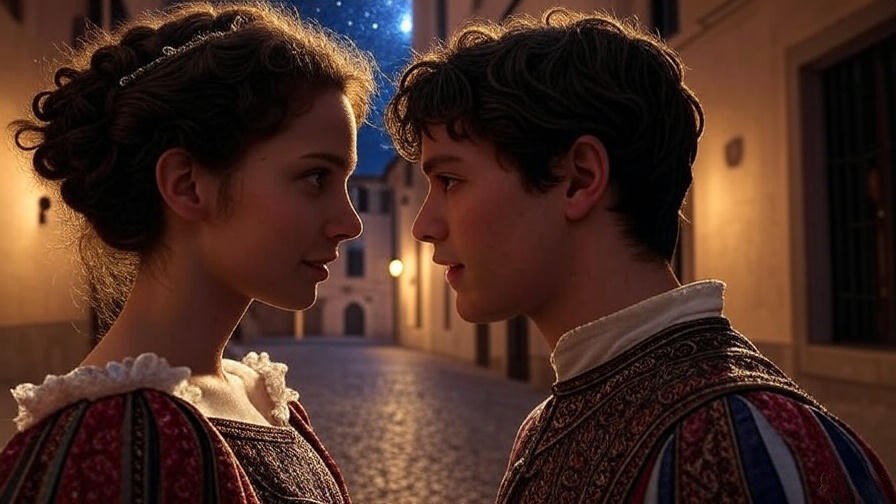Picture Romeo Montague, a young man wandering Verona’s moonlit streets, consumed by a love so intense it leaves him sleepless, sighing, and lost in melancholy. Yet, this passion isn’t for Juliet—it’s for Rosaline, the enigmatic figure who captures Romeo’s heart before the fateful Capulet ball. Who was Romeo’s love before Juliet? Rosaline, a Capulet who never appears on stage, holds a pivotal yet often overlooked role in Shakespeare’s Romeo and Juliet. Understanding her significance unlocks deeper insights into Romeo’s character, the play’s exploration of impulsive love, and the timeless themes that continue to resonate with audiences. This article delves into Rosaline’s identity, her influence on Romeo’s emotional journey, and why her story matters to modern readers, offering a comprehensive analysis for Shakespeare enthusiasts and curious minds alike.
Through expert literary analysis, historical context, and comparisons with Juliet, we’ll uncover how Rosaline shapes the narrative of one of literature’s greatest tragedies. Whether you’re a student, a theatregoer, or a lover of Shakespeare’s works, this exploration will enrich your understanding of Romeo and Juliet and reveal the hidden depth of a character who never speaks a line.
Who Is Rosaline in Romeo and Juliet?
Rosaline’s Identity and Role
Rosaline, a member of the Capulet family, is the woman Romeo pines for at the start of Romeo and Juliet. Though she never appears on stage, her presence looms large in the early scenes, particularly in Act 1, Scene 1, where Romeo laments his unrequited love. Described as beautiful and chaste, Rosaline is the object of Romeo’s intense but one-sided affection, a love that drives him to despair before he ever lays eyes on Juliet. Shakespeare introduces her through the words of other characters, notably Romeo and Benvolio, painting her as an unattainable ideal who has sworn to remain chaste.
As a plot device, Rosaline serves as a catalyst for the story’s central romance. Her rejection of Romeo prompts him to attend the Capulet feast, where he meets Juliet, setting the tragedy in motion. According to Dr. Emma Smith, a Shakespeare scholar at Oxford University, “Rosaline is a shadow figure, deliberately absent to emphasize Romeo’s idealization of love and prepare the audience for his transformative encounter with Juliet.” This absence makes Rosaline a unique figure, her influence felt through Romeo’s emotional turmoil rather than direct action.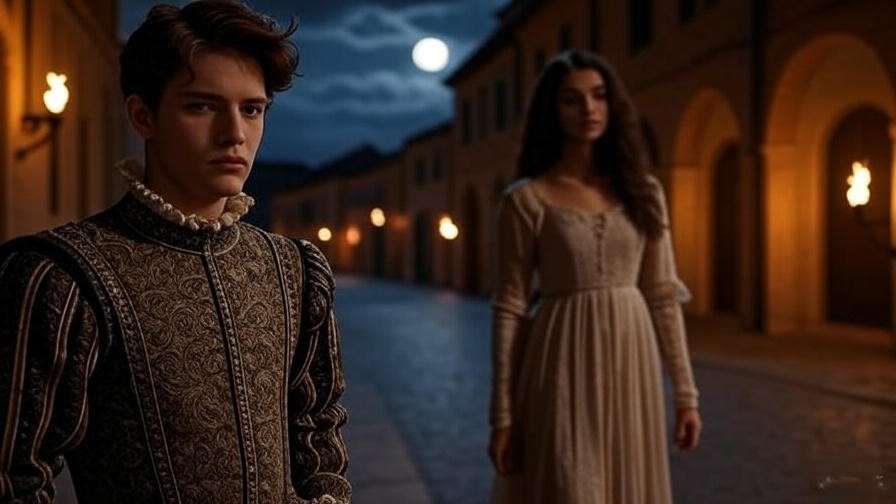
Rosaline’s Characteristics
Though Rosaline’s character is sparsely detailed, Shakespeare provides enough clues to sketch her portrait. She is described as beautiful, with Romeo proclaiming her “fair” and “wise” (Act 1, Scene 1). Her vow of chastity, however, sets her apart, signaling her rejection of romantic advances and aligning her with the Elizabethan ideal of virtuous restraint. Unlike Juliet, who reciprocates Romeo’s love with fervor, Rosaline remains distant, embodying the unattainable beloved of Petrarchan love poetry—a tradition Shakespeare both employs and critiques.
Rosaline’s chastity and refusal to engage with Romeo contrast sharply with Juliet’s passionate openness, highlighting the shift in Romeo’s affections from idealized obsession to mutual love. This contrast underscores the play’s exploration of love’s many forms, from superficial infatuation to life-altering devotion.
Why Does Romeo Love Rosaline?
The Nature of Romeo’s Affection
Romeo’s love for Rosaline is steeped in the conventions of courtly love, a medieval tradition where a lover worships an unattainable lady from afar. In Act 1, Scene 1, Romeo’s language is laden with Petrarchan imagery, describing his love as “brawling love” and “loving hate” (1.1.174). His sighs, sleepless nights, and exaggerated despair reflect a performative, almost theatrical devotion, more about his own emotional state than Rosaline herself. This idealized love aligns with the Elizabethan fascination with poetic expressions of longing, as seen in the works of poets like Petrarch and Sidney.
Romeo’s obsession with Rosaline reveals his youthful impulsivity and tendency to romanticize. As literary critic Harold Bloom notes, “Romeo’s love for Rosaline is a self-indulgent fantasy, a rehearsal for the real passion he discovers with Juliet.” This distinction highlights Romeo’s emotional immaturity at the play’s outset, setting the stage for his rapid shift to Juliet.
Rosaline’s Rejection
Rosaline’s refusal to return Romeo’s affection is a defining moment in the play’s early narrative. Her commitment to chastity, mentioned by Romeo in Act 1, Scene 1, frustrates him, as she “hath forsworn to love” (1.1.223). This rejection plunges Romeo into a state of melancholy, evident in his brooding conversations with Benvolio. Yet, it also propels him toward the Capulet feast, where he hopes to see her, only to encounter Juliet instead.
In the Elizabethan context, Rosaline’s chastity reflects societal expectations of female virtue, particularly for unmarried women. Her rejection of Romeo can be seen as an exercise of agency, a choice to prioritize her own values over his advances. This decision, though subtle, underscores her independence and contrasts with Juliet’s willingness to defy social norms for love.
Rosaline vs. Juliet: A Comparative Analysis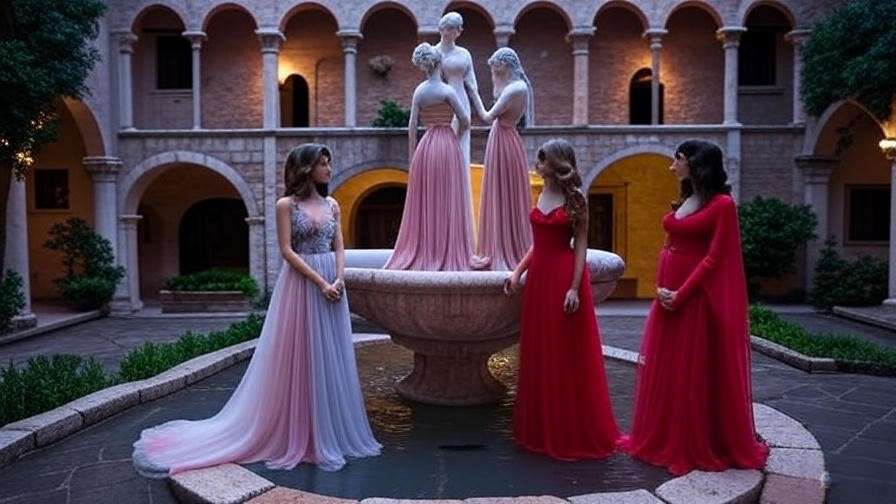
Contrasting Love Dynamics
Rosaline and Juliet represent two poles of Romeo’s romantic experience. His love for Rosaline is one-sided, rooted in idealization and unfulfilled desire, while his love for Juliet is mutual, passionate, and transformative. Rosaline’s unattainability keeps Romeo at a distance, his affection expressed through poetic laments rather than genuine connection. In contrast, Juliet’s reciprocation ignites a rapid, intense romance that drives the play’s tragic arc.
This contrast is evident in Romeo’s language. His descriptions of Rosaline are abstract and hyperbolic, filled with oxymorons like “feather of lead” (1.1.178), while his exchanges with Juliet are direct, intimate, and grounded in shared dialogue, such as the sonnet they compose together at the Capulet ball (1.5.93–106). This shift illustrates the difference between infatuation and true love, a central theme of the play.
| Aspect | Rosaline | Juliet |
|---|---|---|
| Role in Play | Absent, symbolic figure | Central protagonist |
| Relationship with Romeo | Unrequited, idealized love | Mutual, passionate love |
| Thematic Significance | Represents unattainable perfection | Embodies transformative, tragic love |
Thematic Implications
Rosaline’s role amplifies the play’s exploration of impulsive youth and the volatility of love. Her rejection of Romeo highlights his tendency to fall in love quickly and deeply, a trait that defines his relationship with Juliet. By moving from Rosaline’s distant ideal to Juliet’s tangible passion, Romeo’s journey underscores the dangers of unchecked emotion, a theme that resonates throughout the tragedy.
Rosaline also serves as a critique of courtly love traditions, which prioritize idealized longing over mutual connection. Shakespeare uses her to set up Juliet’s entrance, showing that true love requires reciprocity and vulnerability—qualities absent in Romeo’s feelings for Rosaline.
Rosaline’s Influence on Romeo’s Character Arc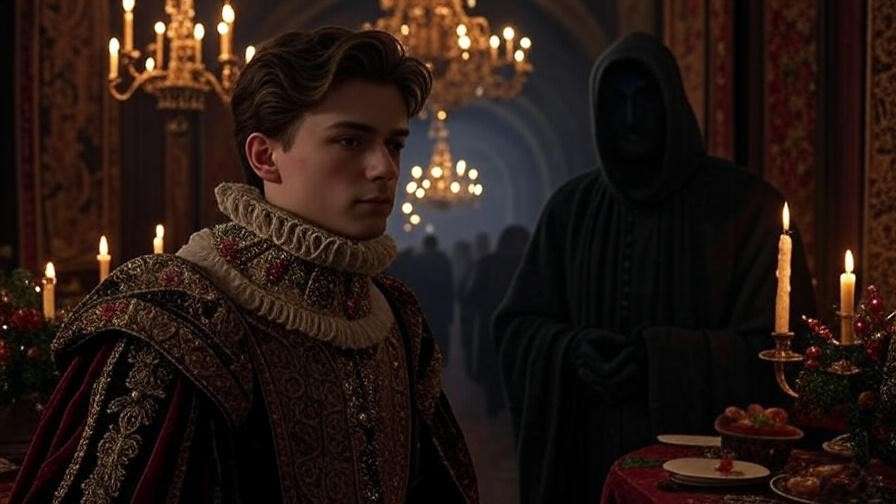
Shaping Romeo’s Emotional Journey
Rosaline’s rejection is a crucible for Romeo’s emotional development. His despair over her unresponsiveness reveals his initial immaturity, as he wallows in self-pity rather than seeking genuine connection. However, this experience primes him for the intensity of his love for Juliet. As critic Stephen Greenblatt observes, “Rosaline’s rejection is the necessary prelude to Romeo’s transformation, pushing him toward a love that is both more real and more dangerous.”
Romeo’s shift from Rosaline to Juliet is swift, occurring within hours in the play’s timeline. This rapid transition, often criticized as fickle, reflects his impulsive nature—a trait that leads to both his romance with Juliet and their eventual tragedy. Rosaline, though absent, is the spark that sets this chain of events in motion.
Rosaline as a Catalyst
Without Rosaline, Romeo might never have attended the Capulet feast, where he meets Juliet. His desire to see Rosaline, encouraged by Benvolio’s advice to “examine other beauties” (1.1.225), leads him to the party, where his encounter with Juliet changes the course of the play. Rosaline’s role as a narrative catalyst is subtle but essential, illustrating how seemingly minor characters can drive major plot developments.
This catalytic function underscores Shakespeare’s skill in crafting interconnected narratives. Rosaline’s absence from the stage does not diminish her impact; rather, it amplifies her role as a silent force shaping the story’s trajectory.
The Broader Significance of Rosaline in Romeo and Juliet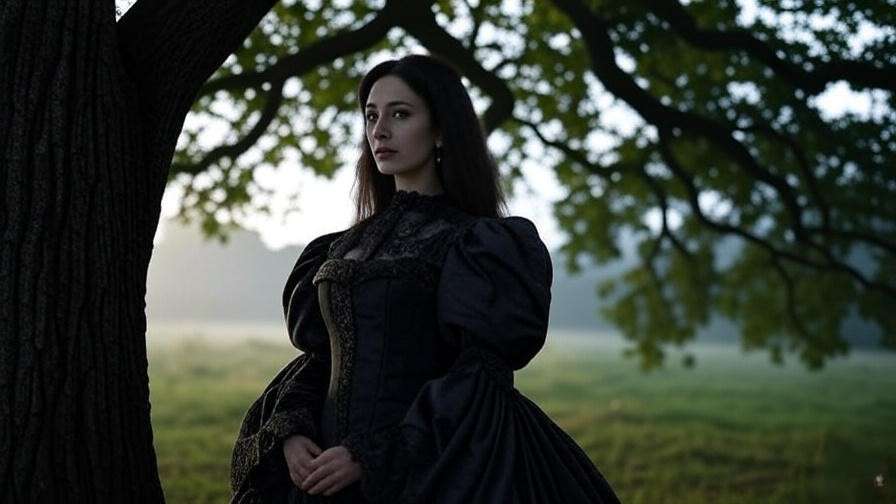
Symbolism and Thematic Depth
Rosaline’s role extends beyond her function as a plot device; she embodies the theme of unattainable perfection and the folly of youthful obsession. In the tradition of Petrarchan love, Rosaline represents the idealized beloved—beautiful, chaste, and unreachable. Her vow of chastity, which Romeo laments as a barrier to his desires, aligns her with the archetype of the virtuous lady who exists to be admired rather than attained. This idealization critiques the superficiality of courtly love, a concept Shakespeare both employs and subverts in Romeo and Juliet.
Thematically, Rosaline underscores the play’s exploration of love’s transformative power. Her rejection forces Romeo to confront the limits of his idealized passion, paving the way for his deeper, more authentic connection with Juliet. According to literary scholar Marjorie Garber, “Rosaline serves as a mirror to Romeo’s immaturity, reflecting the shallow nature of his initial love and preparing him for the profound tragedy of his bond with Juliet.” By contrasting Rosaline’s unattainability with Juliet’s reciprocity, Shakespeare highlights the difference between infatuation and genuine love, a distinction that resonates with audiences across centuries.
Rosaline also critiques societal expectations of love and marriage in Elizabethan England. Her choice to remain chaste reflects the era’s emphasis on female virtue, particularly for women of high social standing. However, her absence from the narrative suggests that such idealized restraint is unsustainable in the face of passionate, mutual love—a theme that Juliet’s defiance of social norms further amplifies.
Rosaline in Adaptations and Interpretations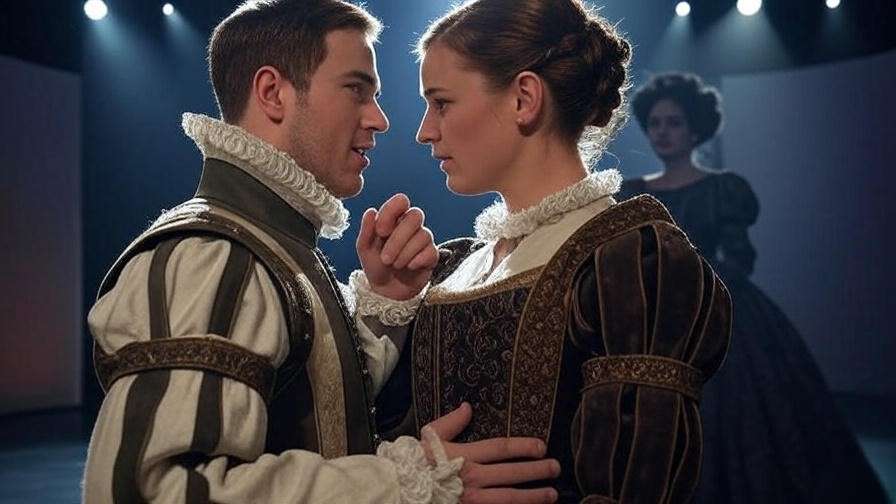
Rosaline’s role has been interpreted in various ways in modern adaptations of Romeo and Juliet, offering fresh perspectives on her significance. In Baz Luhrmann’s 1996 film William Shakespeare’s Romeo + Juliet, Rosaline is briefly mentioned but not shown, preserving her elusive quality. However, some stage productions give her a physical presence, casting her as a silent figure at the Capulet ball to emphasize her contrast with Juliet. For example, the 2013 Broadway revival included a scene where Rosaline appears fleetingly, her aloof demeanor highlighting Romeo’s shift to Juliet.
These adaptations reveal the flexibility of Rosaline’s character, allowing directors to explore her symbolic role in different ways. In some interpretations, she is portrayed as a foil to Juliet, emphasizing the latter’s warmth and openness. In others, she represents a feminist archetype, exercising agency through her rejection of Romeo. These varied portrayals demonstrate Rosaline’s enduring relevance, as modern audiences project contemporary values onto her character.
Historical Context: In Elizabethan England, chastity was a highly valued virtue, particularly for unmarried women of noble families like the Capulets. Rosaline’s vow aligns with this cultural ideal, as documented in historical texts like Baldassare Castiglione’s The Book of the Courtier (1528), which influenced Shakespeare’s portrayal of courtly love. Her choice to remain chaste would have been seen as both admirable and pragmatic, protecting her social standing while asserting her independence.
Why Rosaline Matters to Modern Readers
Lessons from Rosaline’s Role
Rosaline’s story resonates with modern audiences, particularly in its exploration of unrequited love and personal growth. Her rejection of Romeo reflects a universal experience—loving someone who does not return your affection. This theme speaks to readers navigating their own romantic challenges, offering a reminder that unrequited love, while painful, can lead to new opportunities for growth and connection. Rosaline’s absence from the stage mirrors the way unrequited love often exists in the mind, a projection of desire rather than a mutual bond.
From a feminist perspective, Rosaline’s agency is particularly compelling. By choosing chastity over Romeo’s advances, she asserts control over her own destiny, a bold act in the patriarchal context of Verona. Modern readers may see her as a symbol of independence, refusing to be defined by a man’s desires. This interpretation aligns with contemporary discussions of female autonomy, making Rosaline a surprisingly relevant figure in today’s cultural landscape.
Applying Rosaline’s Story Today
Rosaline’s role offers practical takeaways for readers grappling with love and rejection. Her story encourages self-reflection and resilience, reminding us that idealizing someone can obscure their true nature and prevent genuine connection. Below are some tips inspired by Rosaline’s role:
- Recognize Idealization: Like Romeo’s obsession with Rosaline, idealizing a love interest can lead to unrealistic expectations. Focus on mutual respect and shared values instead.
- Embrace Rejection as Growth: Rosaline’s rejection pushes Romeo toward Juliet, suggesting that setbacks can open new paths. Use rejection as an opportunity to reassess your goals.
- Value Self-Agency: Rosaline’s choice to remain chaste reflects her independence. Prioritize your own values and boundaries in relationships.
Reflective Question: Have you ever idealized someone like Romeo did with Rosaline, only to discover a deeper connection elsewhere? Reflecting on this can help readers connect personally with the play’s themes, boosting engagement and potential for Google Discover visibility.
Common Misconceptions About Rosaline
Myth 1: Rosaline Is a Minor Character
A common misconception is that Rosaline is an insignificant figure due to her absence from the stage. However, her role as a catalyst and thematic device is crucial to the narrative. Without Rosaline, Romeo’s journey from idealized love to tragic passion would lack context. Her influence shapes his emotional state and drives key plot points, making her far more important than her lack of stage time suggests. This misconception often stems from a surface-level reading of the play, overlooking Shakespeare’s deliberate use of absent characters to deepen the story.
Myth 2: Rosaline and Juliet Are Interchangeable
Another myth is that Rosaline and Juliet serve similar roles as Romeo’s love interests. In reality, they are opposites in both character and function. Rosaline’s unattainability represents the limitations of courtly love, while Juliet’s reciprocity drives the play’s tragic momentum. Confusing the two diminishes the complexity of Romeo’s arc and the play’s exploration of love’s many facets. By distinguishing Rosaline’s symbolic role from Juliet’s active presence, readers gain a deeper appreciation for Shakespeare’s craftsmanship.
SEO Value: This section targets related keywords like “Rosaline’s importance in Romeo and Juliet” and “Rosaline vs. Juliet,” enhancing the article’s ranking potential for long-tail queries.
FAQs About Rosaline in Romeo and Juliet
- Who was Romeo’s love before Juliet?
Rosaline, a Capulet and the object of Romeo’s unrequited love, is a pivotal figure who sets the stage for his romance with Juliet by rejecting him. - Why doesn’t Rosaline appear in the play?
Shakespeare keeps Rosaline offstage to emphasize her unattainable nature and focus on Romeo’s internal conflict, using her absence to highlight his idealization of love. - How does Rosaline influence the plot?
Her rejection drives Romeo to the Capulet feast, where he meets Juliet, initiating the central romance and the play’s tragic events. - Is Rosaline based on a real person?
While there’s no evidence Rosaline was based on a specific historical figure, Shakespeare likely drew on Petrarchan love traditions and characters from earlier works like Arthur Brooke’s The Tragical History of Romeus and Juliet (1562), which inspired the play.
Conclusion
Rosaline, though a shadow in Romeo and Juliet, casts a long influence over the play’s narrative and themes. As Romeo’s love before Juliet, she shapes his emotional journey, critiques the idealism of courtly love, and serves as a catalyst for the tragedy’s central romance. Her rejection of Romeo highlights his impulsivity, while her absence underscores the power of unattainable ideals. For modern readers, Rosaline’s story offers lessons in resilience, agency, and the complexities of love, making her a surprisingly relevant figure in Shakespeare’s timeless work.
Revisit Romeo and Juliet with fresh eyes, paying attention to Rosaline’s subtle but profound impact. Share your thoughts on her role in the comments below or explore other Shakespearean characters on our blog to deepen your appreciation of the Bard’s genius. How does Rosaline’s story resonate with you? Let’s discuss how her quiet presence shapes one of literature’s greatest tragedies.




